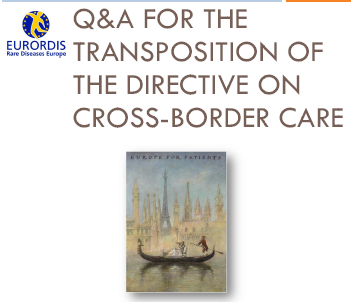EURORDIS releases Q&A to help patients advocate for their right to cross border healthcare
June 2012EURORDIS has prepared a Questions & Answers document to help you understand the EU legislation on cross border healthcare and to ensure its transposition into national law is favorable to rare disease patients.
The document, presents in 21 points, the main aspects to look out for when seeking to apply patient’s rights to cross border healthcare. For example, issues such as level of reimbursement, need for upfront payment, need for prior authorisation and reasons for refusal. It answers frequently asked questions such as: “Can I seek healthcare abroad if the treatment is not available in my country?” “Where can we find information on care provided in other Member States?” or “Can we ask for travel and accommodation expenses to be also reimbursed?” (Read the Q&A)
 The Directive on Patients’ Rights for Cross-Border Care was officially adopted in March 2011. It aims to help patients exercise their right to reimbursement for healthcare received in another EU country; provide assurance about safety and quality of cross-border healthcare and establish formal cooperation between health systems. This is especially important for rare disease patients who cannot find the right care locally or need to access a centre of expertise in another country.
The Directive on Patients’ Rights for Cross-Border Care was officially adopted in March 2011. It aims to help patients exercise their right to reimbursement for healthcare received in another EU country; provide assurance about safety and quality of cross-border healthcare and establish formal cooperation between health systems. This is especially important for rare disease patients who cannot find the right care locally or need to access a centre of expertise in another country.
Member States have until October 2013 to transpose the Directive into national law and adopt appropriate measures. During this process, patients and their organisations have an opportunity to assert the right of every EU citizen to healthcare in another Member State and to make their voices heard when implementing this legislation.
At EURORDIS Membership Meeting in May, Nathalie Chaze from the European Commission’s Directorate for Health presented an overview of the Directive. Also, patient advocates discussed why and how a patient organisation should influence the process taking the case of cross border healthcare between Belgium and the Netherlands and the case of Luxembourg. (View the presentations)
If you would like to receive EURORDIS’ Q&A in your own language, contact us at: eurordis@eurordis.org
Read the full text of the EU Directive on Patients’ Rights in Cross-border Healthcare
Read an article in which Yann Le Cam highlights how the Directive will foster patient mobility and greater cooperation on rare diseases (Public Service Review: European Union: issue 22)
View an eloquent testimony from a clinician from the centre of expertise for Epidermolysis Bullosa in Austria at the Rare Disease Day 2011 European Symposium

